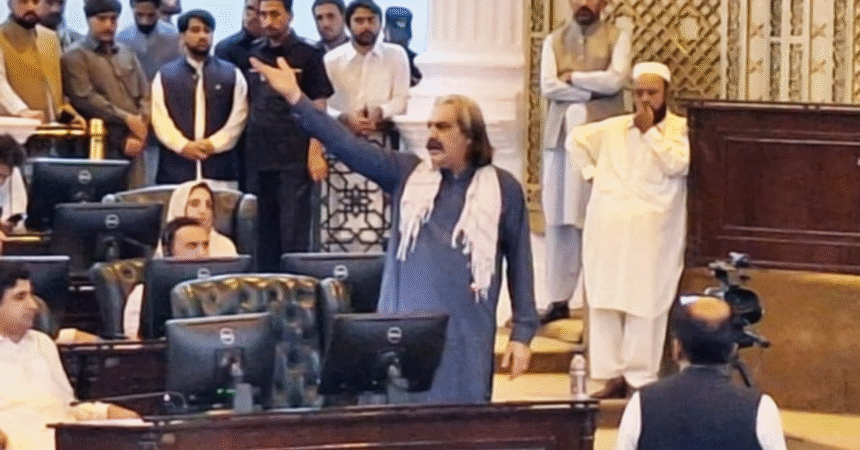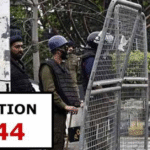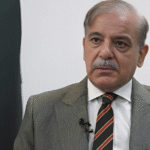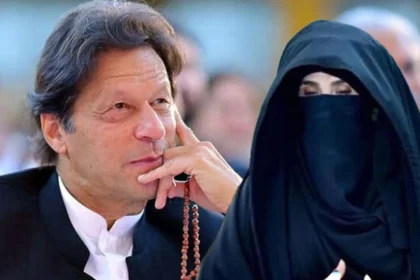In a remarkable turn of events, Ghulam Muhammad Gandapur, a prominent political figure in Khyber Pakhtunkhwa (KP), has resurfaced in the KP Assembly after a brief hiatus. His return marks a significant moment in the province’s political landscape, igniting discussions among political analysts, party loyalists, and the general populace. Gandapur’s presence is expected to influence ongoing legislative processes and the overall dynamics of the assembly.
A Brief Overview of Ghulam Muhammad Gandapur’s Political Career
Ghulam Muhammad Gandapur, a member of the Pakistan Tehreek-e-Insaf (PTI) party, has been a notable figure in KP politics for several years. Born and raised in Dera Ismail Khan, Gandapur’s political journey began when he joined the PTI during its formative years. His charisma and ability to connect with the grassroots level have earned him a loyal following among his constituents.
Before his return to the assembly, Gandapur served in various capacities, including as the Minister for Revenue, Excise, and Taxation. His contributions to KP’s governance and administrative reforms have been acknowledged by both his supporters and critics. His tenure was characterized by efforts to enhance the province’s revenue generation and improve public service delivery.
Despite facing challenges and controversies throughout his political career, Gandapur has managed to maintain his influence within the PTI and the KP Assembly. His return is seen as a strategic move, especially given the evolving political landscape in the province and the upcoming elections.
The Political Context of Gandapur’s Return
Gandapur’s reappearance in the KP Assembly comes at a time when the province is grappling with various issues, including economic challenges, governance concerns, and security threats. His presence is expected to bolster the PTI’s standing in the assembly, especially as the party seeks to consolidate its position ahead of future elections.
Political analysts argue that Gandapur’s return is strategically timed. With the opposition parties gaining traction and public sentiment shifting in favor of alternative political narratives, the PTI is keen to leverage Gandapur’s popularity to counteract potential threats. His ability to rally support among the youth and grassroots activists will be crucial for the party’s efforts to regain momentum.
Moreover, Gandapur’s familiarity with the local political landscape positions him as a valuable asset for the PTI. His insights into constituency dynamics and issues facing the electorate will be instrumental in shaping the party’s policies and legislative agenda in the coming months.
Gandapur’s Role in Legislative Processes
As a member of the KP Assembly, Gandapur’s role will be pivotal in influencing legislative processes and decisions. His experience in governance and public administration equips him to contribute meaningfully to discussions on key issues affecting the province. These include education, healthcare, infrastructure development, and social welfare programs.
Gandapur’s re-entry into the assembly is likely to reignite debates on various legislative proposals. His previous advocacy for reforms in the revenue sector and tax policies is expected to resurface, prompting discussions on enhancing fiscal policies to better serve the needs of the province. Additionally, his insights into local governance will aid in identifying areas where improvements can be made.
Furthermore, Gandapur’s strong communication skills and ability to articulate concerns on behalf of his constituents will enable him to effectively represent the interests of the people of Dera Ismail Khan and the broader KP region. His engagement with the assembly will facilitate a more inclusive legislative process, ensuring that diverse voices are heard.
The Reaction from Political Rivals and Allies
Gandapur’s return has elicited varied reactions from political rivals and allies alike. Supporters within the PTI have welcomed his presence, viewing it as a reinforcement of the party’s commitment to addressing the challenges facing the province. Many party loyalists believe that Gandapur’s return will invigorate the PTI’s base and reenergize grassroots activism.
Conversely, opposition parties have expressed skepticism about the impact of Gandapur’s return on the political landscape. Critics argue that his presence may not significantly alter the dynamics within the assembly, particularly given the challenges faced by the PTI in recent months. They emphasize the need for substantive policy changes rather than a mere reshuffling of political figures.
Prominent opposition leaders have seized the opportunity to criticize the PTI’s governance record, pointing to the province’s economic challenges and social issues. They argue that while Gandapur’s return may provide a temporary boost to the PTI, it does not address the underlying concerns that have led to growing discontent among the electorate.
Implications for Khyber Pakhtunkhwa’s Governance
Gandapur’s re-entry into the KP Assembly carries significant implications for the province’s governance. His familiarity with the intricacies of provincial politics positions him to play a critical role in shaping the PTI’s policy direction and response to pressing challenges.
As the province grapples with economic difficulties, including inflation and unemployment, Gandapur’s insights into fiscal management will be crucial. His previous experience in the Ministry of Revenue equips him with the knowledge needed to navigate complex economic issues and propose viable solutions.
Additionally, Gandapur’s focus on public service delivery aligns with the PTI’s overarching narrative of governance reform. His advocacy for enhancing healthcare access, improving education quality, and addressing infrastructure deficits will resonate with constituents who have expressed frustration over service shortcomings.
The upcoming budget discussions in the KP Assembly will provide Gandapur with a platform to influence fiscal priorities and advocate for policies that directly benefit the people of the province. His ability to forge alliances within the assembly will be vital in garnering support for critical initiatives.
The Youth Vote and Gandapur’s Appeal
One of the most significant aspects of Gandapur’s political presence is his appeal to the youth. As Pakistan’s demographic landscape shifts, with a growing proportion of young voters, Gandapur’s ability to connect with this demographic will be pivotal for the PTI’s electoral prospects.
Gandapur’s emphasis on youth empowerment, job creation, and education resonates with the aspirations of young Pakistanis seeking meaningful opportunities. His return to the assembly provides a renewed focus on policies that cater to the needs and concerns of the youth, ensuring their voices are represented in the decision-making process.
Furthermore, Gandapur’s engagement with youth organizations and civil society groups will strengthen the PTI’s grassroots network and mobilize support ahead of upcoming elections. By actively participating in community initiatives and outreach programs, Gandapur can demonstrate the party’s commitment to addressing the aspirations of young voters.
The Role of Media in Shaping Public Perception
The media plays a crucial role in shaping public perception of political figures and events. As Gandapur reestablishes his presence in the KP Assembly, media coverage will significantly influence how his return is perceived by the public.
Positive media narratives highlighting Gandapur’s past achievements and future aspirations can enhance his reputation and bolster support for the PTI. Conversely, critical coverage focusing on past controversies or highlighting the challenges faced by the PTI can impact public sentiment.
Gandapur’s adeptness at leveraging social media platforms further amplifies his reach and allows him to connect directly with constituents. By sharing updates, engaging in dialogue, and responding to concerns through social media, Gandapur can cultivate a positive public image and foster a sense of community among his supporters.
Challenges Ahead for Gandapur and the PTI
Despite the optimism surrounding Gandapur’s return, challenges lie ahead for both him and the PTI. The party must navigate a complex political landscape characterized by opposition from rival parties and growing public scrutiny.
The PTI’s governance record in Khyber Pakhtunkhwa, including issues related to education, healthcare, and economic development, will remain focal points of criticism. Gandapur will need to address these concerns proactively and propose tangible solutions that resonate with the electorate.
Furthermore, internal party dynamics may pose challenges for Gandapur’s influence within the PTI. As political alliances shift and new leaders emerge, maintaining unity within the party will be crucial for effectively implementing the party’s agenda and addressing the needs of the province.
Looking Ahead: The Future of Khyber Pakhtunkhwa Politics
Gandapur’s return to the KP Assembly signals a new chapter in the province’s political narrative. As the PTI navigates the challenges ahead, Gandapur’s experience and connections will play a vital role in shaping the party’s strategy.
The upcoming electoral cycle presents an opportunity for the PTI to recalibrate its approach and engage with the electorate on pressing issues. Gandapur’s presence in the assembly will be instrumental in formulating policies that resonate with constituents and address their concerns.
In conclusion, Ghulam Muhammad Gandapur’s return to the KP Assembly marks a significant development in the province’s political dynamics. As he reintegrates into the legislative process, his influence and contributions will be closely watched, both by supporters and critics alike. The coming months will determine the extent to which Gandapur can leverage his experience and popularity to effect meaningful change in Khyber Pakhtunkhwa
#GhulamMuhammadGandapur #KPKAssembly #PakistanPolitics #PoliticalAnalysis #PTI #YouthEmpowerment #Governance #KhyberPakhtunkhwa #ElectoralPolitics #PublicService







